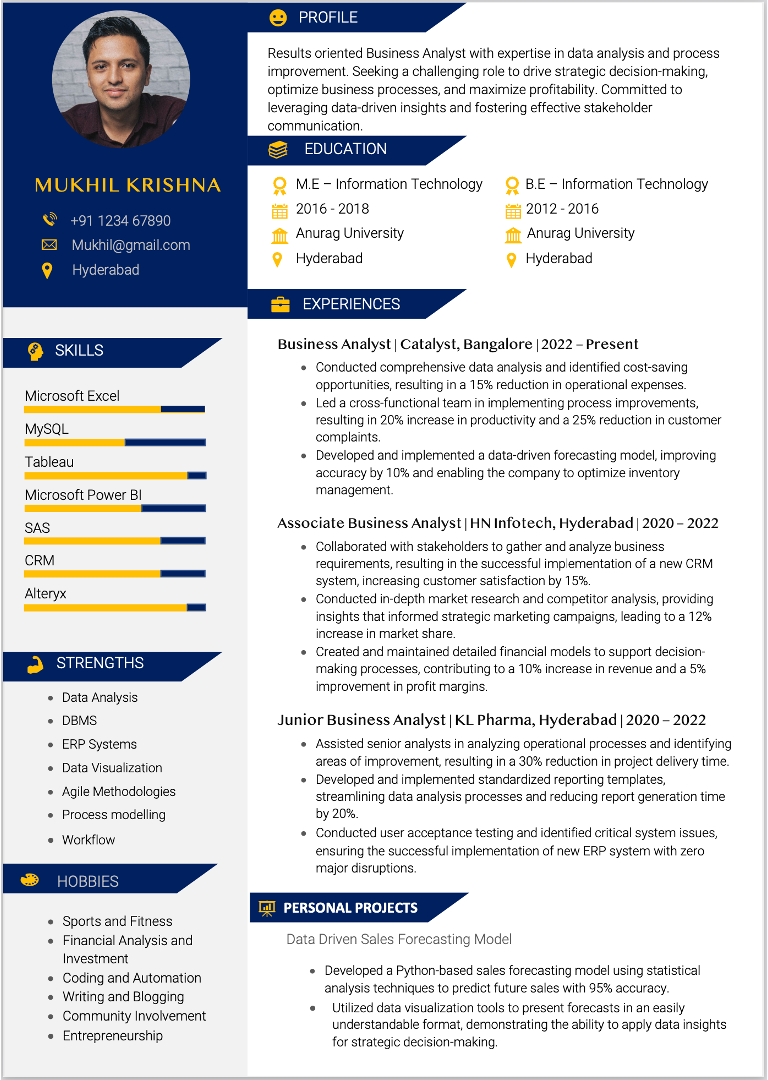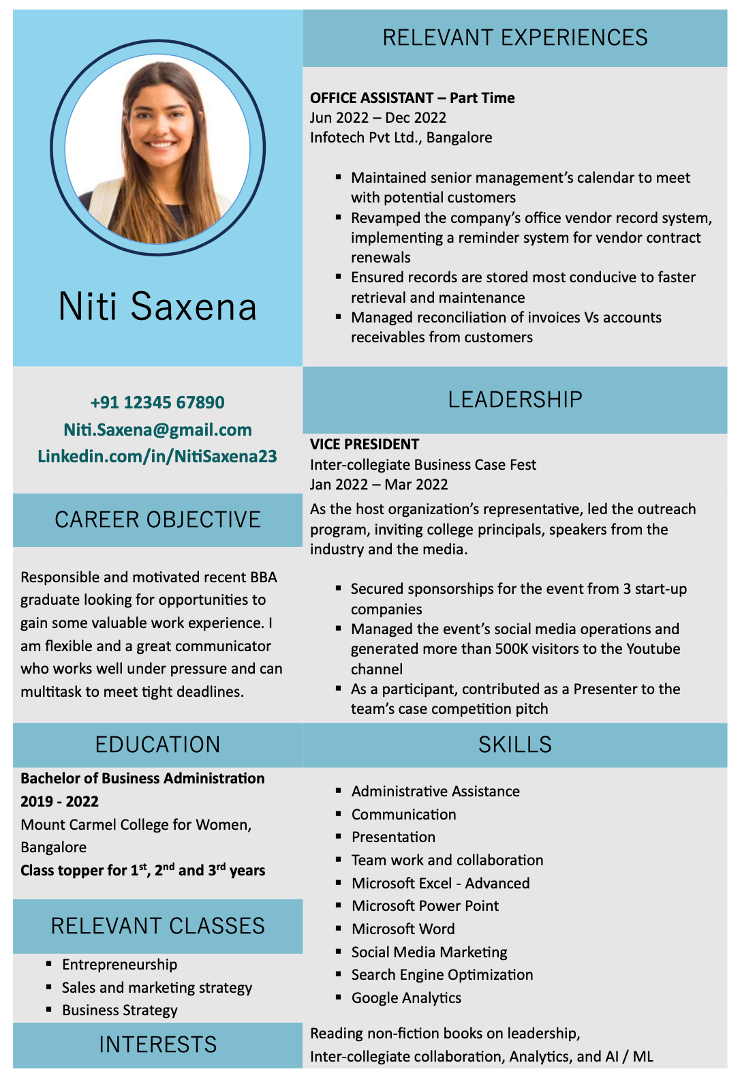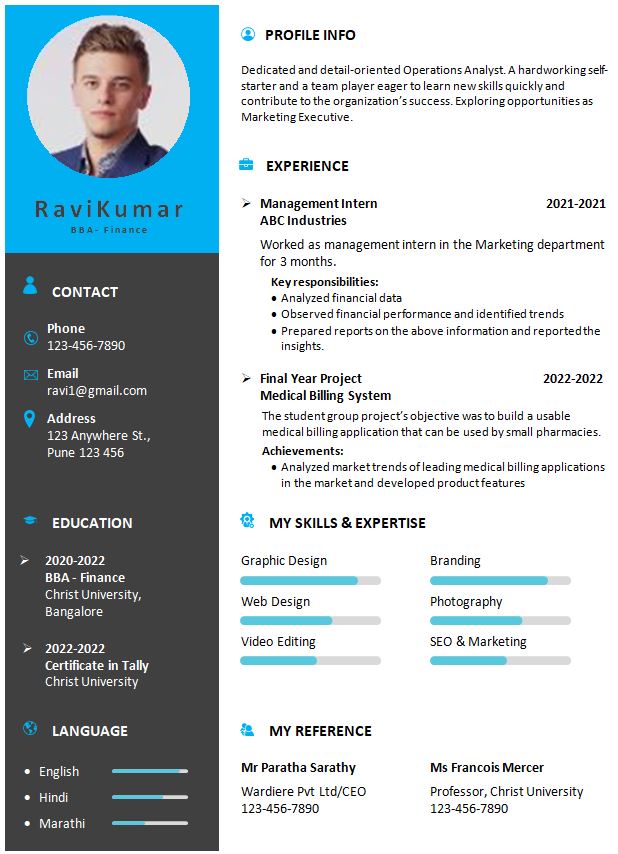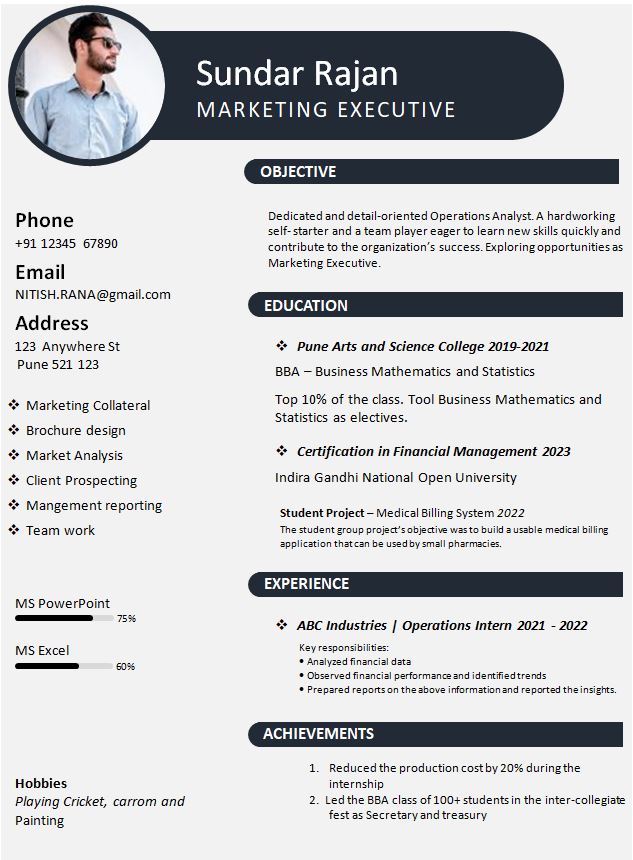Modern Resume
Business Analyst Sample Resume
Business Analyst Sample
bizAn


Objective
If you are a fresh graduate and looking for a Business Analyst position, you can write your objective statement like below, focussing on your ability to solve problems.
Sample career objective statement
"Motivated and detail-oriented BBA graduate with a passion for leveraging data-driven insights to optimize business processes. Seeking a challenging Business Analyst position to apply my analytical skills, strategic thinking, and solid foundation in business administration. Eager to contribute to a dynamic team, utilizing my strong quantitative and qualitative analysis capabilities to drive informed decision-making and enhance operational efficiency within a forward-thinking organization."
Education
B.E – Information Technology, BCA, BBA, BTech - IT, BE Computer Science, BBA, BCom, and BSc degrees in Math and Science as focus areas.
Skills
Many job seekers are confused about what to list under Skills in their resumes, especially if they are recent graduates without formal, full time work experiences yet. One of the easiest and effective ways to address this problem is to focus on the skills section as an opportunity to list various software applicatiosn that you are decent at. By being decent, we mean you are able to get some work done. You don't have to be the best in the field but be at least able to operate the software with some proficiency and are passionate about using that software.
Including relevant software tools in the skills section of your resume can enhance your profile and demonstrate to employers that you possess the technical proficiency needed for a Business Analyst role. Here are some software tools that are commonly used in the field, and that you can consider listing on your resume:
Microsoft Excel:
Proficiency in Excel, including functions like pivot tables, data analysis, and chart creation, is often crucial for a Business Analyst.
SQL and Database Management Systems (DBMS):
Knowledge of SQL and experience with database management systems (such as MySQL, PostgreSQL, or Microsoft SQL Server) is valuable for querying databases and extracting meaningful insights.
Data Visualization Tools:
Familiarity with data visualization tools like Tableau or Power BI can be advantageous for creating compelling and easy-to-understand visual representations of data.
Statistical Analysis Software:
Depending on the industry, experience with statistical analysis software like R or Python (with pandas and numpy libraries) can be beneficial for advanced data analysis.
Business Intelligence (BI) Tools:
Exposure to BI tools such as QlikView, MicroStrategy, or IBM Cognos can be an asset, as they are commonly used for business analytics and reporting.
Project Management Software:
Knowledge of project management tools like Jira, Trello, or Asana can showcase your ability to organize tasks, collaborate with teams, and manage projects efficiently.
Customer Relationship Management (CRM) Software:
Familiarity with CRM systems like Salesforce or HubSpot can be relevant, especially if the job involves analyzing customer data.
Version Control Systems:
Understanding version control systems like Git can be advantageous, as it is widely used in collaborative software development environments.
Microsoft Access:
Proficiency in Microsoft Access, a relational database management system, can be valuable for handling and analyzing large datasets. Microsoft PowerPoint: Strong presentation skills are often required for a Business Analyst. Microsoft PowerPoint can be used for creating clear and impactful presentations.
Crafting Your Resume for Business Analyst Positions
Tailor Your Resume: Customize your resume for each job application by emphasizing the software tools that are specifically mentioned in the job description.
Highlight Relevant Projects: If you have completed projects or coursework where you utilized these tools, highlight them in your resume to provide concrete examples of your skills.
Quantify Achievements: Where possible, quantify your achievements. For example, mention how you improved efficiency, reduced costs, or enhanced decision-making using specific tools.
Showcase Soft Skills: In addition to technical skills, highlight soft skills such as problem-solving, critical thinking, and communication, which are essential for a successful Business Analyst. Continuous Learning: Mention any ongoing efforts to enhance your skills, such as participation in online courses, certifications, or self-directed learning.
Don't forget that your resume is an opportunity to showcase not only your technical skills but also your ability to apply them to real-world scenarios. Understanding this key distinction has unlocked successes to many fresh graduates. So, do not focus on how well you know a particular software, for example, rather focus on how well can you apply what you know in a real world scenario.
Projects
Data Driven Sales Forecasting Model
• Developed a Python-based sales forecasting model using statistical analysis techniques to predict future sales with 95% accuracy.
• Utilized data visualization tools to present forecasts in an easily understandable format, demonstrating the ability to apply data insights for strategic decision-making.
Experience
Business Analyst | Catalyst, Bangalore | 2022 – Present
• Conducted comprehensive data analysis and identified cost-saving opportunities, resulting in a 15% reduction in operational expenses.
• Led a cross-functional team in implementing process improvements, resulting in 20% increase in productivity and a 25% reduction in customer complaints.
• Developed and implemented a data-driven forecasting model, improving accuracy by 10% and enabling the company to optimize inventory management.
Associate Business Analyst | HN Infotech, Hyderabad | 2020 – 2022
• Collaborated with stakeholders to gather and analyze business requirements, resulting in the successful implementation of a new CRM system, increasing customer satisfaction by 15%.
• Conducted in-depth market research and competitor analysis, providing insights that informed strategic marketing campaigns, leading to a 12% increase in market share.
• Created and maintained detailed financial models to support decision-making processes, contributing to a 10% increase in revenue and a 5% improvement in profit margins.
Junior Business Analyst | KL Pharma, Hyderabad | 2020 – 2022
• Assisted senior analysts in analyzing operational processes and identifying areas of improvement, resulting in a 30% reduction in project delivery time.
• Developed and implemented standardized reporting templates, streamlining data analysis processes and reducing report generation time by 20%.
• Conducted user acceptance testing and identified critical system issues, ensuring the successful implementation of new ERP system with zero major disruptions.
Additional Inputs
Have an interview coming up for a Business Analyst position? Congratulations! If you are a career changer and have your first Business Analyst job interview, here are some tips for you to prepare your best.
Research the Company:
Familiarize yourself with the company's products, services, and industry.
Understand the company's mission, values, and recent achievements.
Research any current or upcoming projects that might be relevant to the Business Analyst role.
Understand the Business Analyst Role:
Review the job description thoroughly to understand the key responsibilities and requirements.
Identify the skills and qualifications the company is seeking in a Business Analyst.
Be prepared to discuss how your background and skills align with the role.
Highlight Transferable Skills:
Emphasize your transferable skills gained from your previous experiences, even if they are not directly related to business analysis.
Showcase skills such as problem-solving, critical thinking, attention to detail, and effective communication.
Prepare for Behavioral Questions:
Anticipate questions about your past experiences, challenges you've faced, and how you've overcome them.
Use the STAR method (Situation, Task, Action, Result) to structure your responses.
Technical Knowledge and Tools:
Be ready to discuss your familiarity with relevant tools and software used in business analysis.
If you lack experience with certain tools, express your eagerness to learn and adapt quickly.
Showcase Analytical Abilities:
Demonstrate your ability to analyze data, make data-driven decisions, and derive actionable insights.
Provide examples of how you've used data to solve problems in your previous roles.
Ask Informed Questions:
Prepare thoughtful questions about the company's business processes, challenges, and expectations for the role.
Inquire about the team structure, collaboration processes, and the organization's approach to business analysis.
Industry Knowledge:
Stay informed about industry trends and advancements relevant to the company.
Showcase your understanding of how industry changes might impact the business and your role as a Business Analyst.
Demonstrate Adaptability:
Highlight instances where you successfully adapted to changes in your previous roles.
Business Analysts often need to adapt to evolving project requirements and shifting priorities.
Communicate Effectively:
Practice clear and concise communication.
Be prepared to explain complex concepts in a way that is easily understandable to both technical and non-technical stakeholders.
Networking and Professional Development:
If you have attended industry events, workshops, or training related to business analysis, mention them.
Highlight your commitment to staying updated on industry best practices.
Cultural Fit:
Showcase how your values align with the company's culture.
Emphasize your ability to work collaboratively in a team-oriented environment.
Mock Interviews:
Practice answering common business analyst interview questions with a friend or mentor.
Conduct mock interviews to enhance your confidence and refine your responses.
Remember to be yourself during the interview and express genuine enthusiasm for the opportunity. Good luck with your Business Analyst interview!


